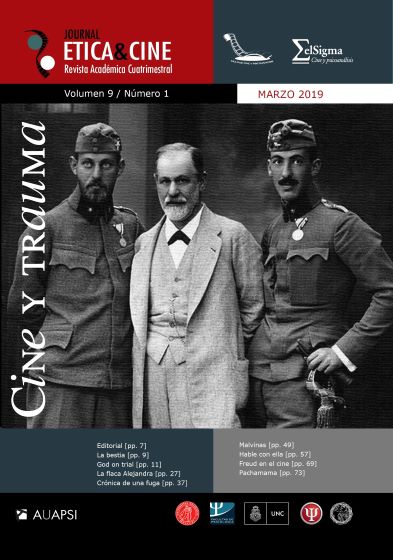“Between Fright and Affection”: Voices of Betrayal and Resistance in the Chilean Transition to Democracy
DOI:
https://doi.org/10.31056/2250.5415.v9.n1.23891Keywords:
Marcia Merino, Carmen Castillo, Transition, Political documentary, VoiceAbstract
The present article seeks to study the film La Flaca Alejandra: vidas y muertes de una mujer chilena, made by Carmen Castillo and Guy Girard in 1994. Produced during the period of the democratic transition, the film focus on the figure of Marcia Merino (political name “La Flaca Alejandra”), far-left militant who became a collaborator of Pinochet’s regime under torture. Throughout the text, it will be argued that Castillo’s film functions as a site for the establishing of a double “mise en scène” of the ‘self’; a place where two divergent life trajectories intersect with each other: that of the filmmaker, present as well in the image, and that of the filmed subject, the “symbol of treason” Marcia Merino. As an instance of a two-fold return to the scene of the trauma, the endeavor of La Flaca Alejandra will finally be understood as an attempt to put into contact, albeit without forcing them to reach a synthesis, two irreconcilable testimonial voices.References
Amorós, M. (2006). Chile: la Memoria como fuerza de la Historia. Recuperado de: http://www.archivochile.com/Ideas_Autores/amorosm/1/1amorosm0016.pdf
Bedregal, X. (1999). La dictadura, gran máquina del olvido, convirtió a Chile en un país de amnesia general. Entrevista con Carmen Castillo. Recuperado de: https://www.jornada.com.mx/1999/04/05/carmen-castillo.htm
Bruzzi, S. (2006). New Documentary. New York: Routledge.
Castillo, C. (Directora). (1994). La Flaca Alejandra [Film]. Francia, Chile.
Comolli, J.-L. (1995). Mon ennemi préféré ? Images documentaires, 23, 45-56.
Daney, S. (2004). Sobre las voces en off, in, out, through. Dans M. Chion, La voz en el cine (pp. 167-171). Madrid: Cátedra.
Donoso, J. (1986). La desesperanza. Barcelona: Seix Barral.
Eltit, D. (1996). Cuerpos nómadas. Hispamerica, 25(75), 3-16.
Gómez-Barris. (2015). The Female Perpetrator. Dans A. J. Lebow, A Companion to Contemporary Documentary Film (pp. 524-535). Somerset: Wiley-Blackwell .
Lazzara, M. (2012). Militancy Then and Now: A Conversation with Carmen Castillo. Journal of Latin American Cultural Studies, 1-14.
Matus, A. (s.d.). Las imperdonables. Récupéré sur Los casos de la Vicaría: http://www.casosvicaria.cl/temporada-uno/las-impredonables/
Merino, M. (1993). Mi verdad: más allá del horror, yo acuso... Santiago de Chile: A. T. G.
Nichols, B. (2017). Introduction to Documentary. Bloomington: Indiana University Press.
Raymond, H. (2011). Carmen Castillo : pour une histoire des vaincus. Dans M. L. Sylvie Rollet, Théorème 14 : Théâtres de la mémoire - Mouvement des images (pp. 145-152). Paris: Sorbonne Nouvelle.
Richard, N. (2010). Crítica de la memoria. Santiago de Chile: Ediciones Diego Portales.
Rodríguez, S. (1988) Entre el espanto y la ternura. En ¡Oh, melancolía! (1ra Ed.) [CD-ROM]. Londres, Inglaterra; La Habana, Cuba: EGREM.
Traverso, A. (2017). La Flaca Alejandra: Post-Dictatorship Documentary and (No) Reconciliation in Chile. Critical Arts, 96-106.
Traverso, E. (2016). Mélancolie de gauche : la force d’une tradition cachée. Paris: La Découverte.
Valenzuela, V. (2006). Yo te digo que el mundo es así: giro performativo en el documental chileno contemporáneo. Doc On-line(1), 6-22.
Downloads
Published
Issue
Section
License
Los autores que publiquen en Ética y Cine Journal aceptan las siguientes condiciones:
Los autores/as conservan los derechos de autor © y permiten la publicación a Ética y Cine Journal, bajo licencia CC BY-SA / Reconocimiento - Reconocimiento-CompartirIgual 4.0 Internacional. La adopción de esta licencia permite copiar, redistribuir, comunicar públicamente la obra, reconociendo los créditos de la misma, y construir sobre el material publicado, debiendo otorgar el crédito apropiado a través de un enlace a la licencia e indicando si se realizaron cambios.

Este obra está bajo una licencia de Creative Commons Reconocimiento-CompartirIgual 4.0 Internacional.




